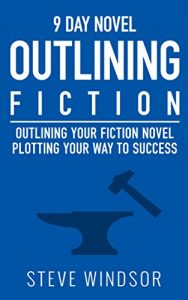Outlining your novel doesn’t have to be hard.
But when was the last time you sat down to write with the confidence and true belief that you knew exactly what story you were going to tell?
Outlining a novel? Where do you start?
If you’re like I was, you started writing your first novel without outlining it first—no idea where your story was headed. Believe me, two novels and almost 500,000 words into that “process” I had to stop and re-evaluate my strategy. Now, before I commit the time and energy to pen a 90,000 word novel, I make a map.
I wrote these Nine Day Novel-Fiction Writing Basics books after I realized how difficult it was for new fiction authors to plot, write, edit and publish their first novel.
This book is a roadmap to get you beyond the theory and into the practicality of putting words on the page in the right order. Novel outlines help.
Being a committed newbie author isn’t easy
Some scoffed at me when I said you can write a novel in nine days. Then I sat down and did it … 4 times.
Now, literally thousands have read my book on writing, describing how to carve out time and write faster by using story structure, and the second book on how to streamline the fiction editing process with Scrivener.
But I made a mistake with those first two books!
Plenty of you emailed me and told me as much.
“Steve, shouldn’t you have started by showing us how to outline a novel? How am I supposed to write 90,000 words of a story when I have no clue where it’s headed?”
Though I detailed the Four Part Story Structure inside NDN: Writing Fiction, the point was taken—outlining your novel… plotting your novel to the Four Part Story Structure—is a difficult task that deserves a more in-depth discussion.
In Nine Day Novel: Outlining I’ll detail:
- Why you should outline your novel
- How to generate ideas and inspiration for your novel
- Whether you should weave your own story into your first novel outline
- How to turn your ideas into high concept stories
- The top ten novel themes and popular variations of them
- How to keep track of settings, vocabulary and characters
- How and why you should create multiple summaries for your novel
Don’t write another book by the seat of your pants!
I’ll show you a step-by-step, milestone-oriented way to ensure that your hero has a worthy journey before you write the opening line of your novel.
I promise you that if you follow the tips on how to outline your novel, examples and structure in this book, your next novel will get planned and plotted better than it would have otherwise. You’ll feel more confident in your story before you start and experience less “writer’s block” trying to figure out where to take your hero next.
And as always I’ll do all of that inside my favorite storytelling structure, the Four Part Story Structure. And, since it’s hard for me to imagine writing more efficiently without it, I’ll introduce you to my favorite writing software, Scrivener!
“The bonuses (for the series) are more than worth the price of the books!”
Bonus writing tools like:
- Four Part Story Structure starter file as a fill-in-the-blanks Scrivener file.
- Editing videos detailing how I self-edit before working with editors right inside Scrivener.
- And for this book, a beat-by-beat example outline for Dixxon-Teen Witch, a novella that I’m co-authoring with a newbie fiction writer, outlining it beforehand using this very book. (Also as a Scrivener starter file.)
The real world, real writing advice in these books has helped hundreds re-energize their writing and rekindle their love for storytelling by giving them the tools to write with confidence. All you have to do to get those same results is to read this book.






